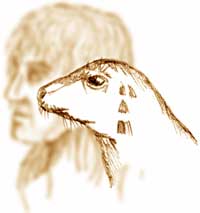
 |
 |
| Home |
| About Orkney |
| History |
| Tradition |
| Folklore |
| Placenames |
| Images |
| Downloads |
| About the Site |
| Contact |
| Links |
| Search Site |
| Awards |
| The origin of the selkie-folk | |
|
"When
angels fell, some fell on the land, some on the sea.
The mythological origin of the selkie-folk was no clearer. When the ancient tales were committed to paper, in the 18th and 19th centuries, some of the old folk claimed that the selkie-folk were, like fairies, fallen angels, condemned to live as animals until the Biblical Day of Judgement. Others insisted that the selkie-folk were once human beings who, for some grave misdemeanour, were doomed to assume the form of a seal and live out the rest of their days in the sea. The third possibility discussed by the Orcadian storytellers of yesteryear was that the selkie-folk were actually the souls of those who had drowned. One night each year these lost souls were permitted to leave the sea and return to their original human form. So as you can see, there was no firm agreement. The origin of the selkie-folk legends is unfortunately no clearer. Selkie lore is not confined to Orkney but is also found in the Western Isles, Ireland and down the north and western coasts of Scotland. There, the seal-people are referred to as "silkies" or "selchies". On first glance, the common element - selkie/silkie/selchie - in these different forms of dialect indicates a common root to the tales of the seal-people, perhaps stemming from early Celtic mythology or tradition. But, in my opinion, the lore of the selkie-folk and that of the Finfolk were once one and the same. And they had a definite Scandinavian source. Click here to learn more. |
The basis of some of the surviving selke-folk legends may be less fantastic. Within a small island community, where everyone knows everyone else, a pregnancy could easily be explained away as the result of a visit from a seductive selkie-man. I wonder how many young lasses protected the identity of their sweethearts with a tale such as this? |
